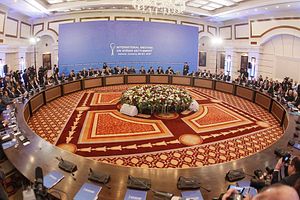Invited by Russia, Iran and Turkey, Syrian rebels and government officials gathered in Kazakhstan to strengthen the shaky ceasefire signed in December. The two-day negotiation fell short of the grand expectations of Kazakh President Nursultan Nazarbayev, who offered Astana as the venue for the talks.
The first day disappointed the hopeful. The opposition groups accused the government of breaking the ceasefire and walked out of the talks. The Syrian government delegate responded by labeling the opposition forces as “terrorist.”
The rebel groups refrained from sitting at the table in light of the government’s bombing in Wadi Barada, near Damascus. “There are no direct negotiations” Issam al-Reid, a member of the armed opposition said. “The talks will be with the United Nations if the ceasefire is not implemented, particularly in Wadi Barada.”
On the second day, the parties still sat at different tables – in different rooms – and continued to accuse each other of undermining the talks. After two days of open acrimony, delegates from the Syrian government and oppositions refused to sign the joint declaration, issued by Russia, Turkey and Iran, on setting up a trilateral commission to monitor the ceasefire.
“There will be no signing,” Yahya al-Aridi, a spokesman for one of the armed rebels sides, said.
Talks at the UN in Geneva are scheduled for February 8, but in the meantime, the rebel groups said they will continue the war of position. “If the negotiations succeed, then we are with the negotiations,” rebel spokesman Osama Abu Zeid told AFP during the talks. “If they don’t succeed, unfortunately we’ll have no choice but to continue fighting.”
With the deadlock still unresolved, the UN talks will be crucial. “The talks in Astana are not an alternative to the Geneva talks next month, but are an additional step,” Roman Vassilenko, the Kazakh deputy foreign minister, said, shrugging off responsibility for the stalled negotiations.
UN special envoy Staffan de Mistura met with Nazarbayev during the first day of negotiations and praised Kazakhstan’s efforts in the resolution of international conflicts.
“Your country has already shown its efforts for the resolution of the most difficult situations in the international arena. Kazakhstan’s non-permanent membership in the UN Security Council will represent an additional opportunity to help resolve the Syrian conflict,” de Mistura told Nazarbayev.
Regardless of the outcome, the Astana meeting on Syria became another badge in Kazakhstan’s collection of diplomatic achievements. After hosting a meeting of the OSCE in 2010, Kazakhstan reached the peak of its international fame – despite shortcomings in the final agreement – and could ascribe the success to decades of pursuing a multi-vector foreign policy.
In 2013, Kazakhstan hosted nuclear talks between the P5+1 and Iran in Almaty. The meeting, chaired by the EU’s Catherine Ashton, ended positively and paved the way for more frequent negotiations.
After these major international successes, Kazakhstan tried to play the role of peace broker two years ago, after the conflict in Ukraine had heated up. In December 2014, Nazarbayev visited Ukraine to hold talks with President Petro Poroshenko. His diplomatic tour continued to Belarus, where he met with Russia’s Vladimir Putin to discuss the Ukraine crisis on the sidelines of a Eurasian Economic Union summit. Hence, Nazarbayev lodged the idea to host peace talks in Astana, to which Putin immediately agreed.
The following January, however, lack of progress in the negotiations led the governments of Germany and France to keep a low profile in the Ukraine talks and to continue to lay the groundwork for a concerted solution in the “Normandy Group” format, which only included Germany, France, Russia and Ukraine. Holding a large “peace meeting” in Astana was perhaps overshooting the concrete possibility of a resolution of the conflict. The Astana talks, scheduled for January 15, 2015 became increasingly unlikely, until they were postponed indefinitely.
The failed attempt to broker a peace deal led Kazakhstan to host negotiations on Syria in Astana the following May. The Syrian conflict continued to worsen and international negotiations had reached a deadlock. The talks of 2015 weaved around the Geneva talks, but had little success and were taken in little consideration by international media because the Syrian government had refused to participate in the talks and the assembly in Astana was deemed just a diplomatic performance. A second meeting in October 2015, featured again only Syrian opposition figures, who called for internationally-monitored elections the following year.
This week’s Syrian talks in Astana could be considered a diplomatic coup, just because they took place. Despite the rather disappointing result, Kazakhstan’s foreign minister Kairat Abdrakhmanov took the podium to read the final statement, which ended with a thank you note to Nazarbayev.
It is unclear whether there will be more meetings of the Syrian sides in Astana in the future. But Kazakhstan will now have one more reason to portray itself as a hub for diplomatic exchanges.

































